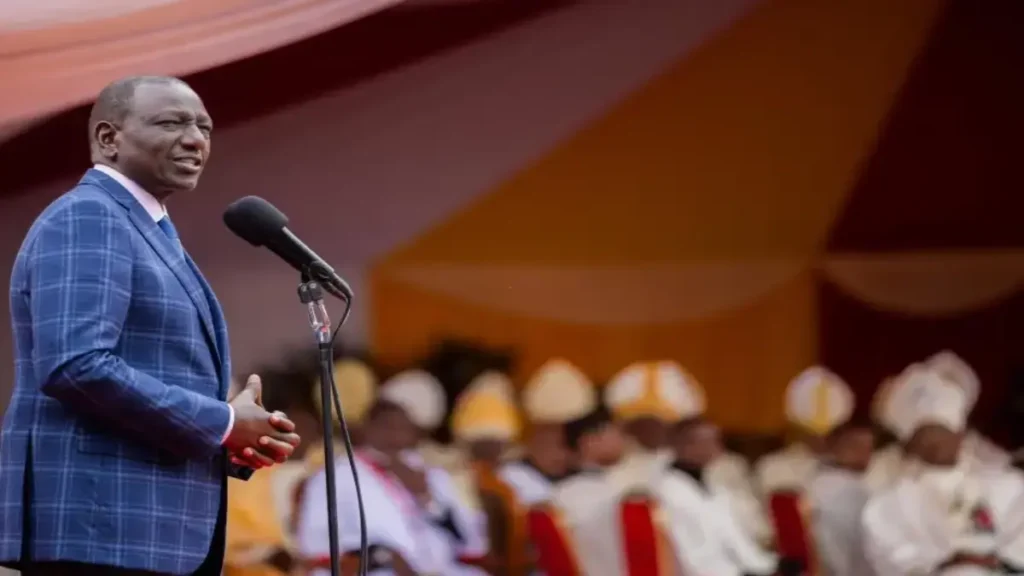In a significant shift of stance, Kenya’s President William Ruto has adopted a more conciliatory approach towards the Catholic bishops. This comes after their recent criticism of his government’s policies and actions.
The president’s change in tone marks a notable departure from his initial defensive response. Earlier, he had dismissed the bishops’ concerns as unfounded and based on hearsay.

President William Ruto speaking during the consecration service of Rev. Peter Kimani as the new Bishop of Embu Diocese on Saturday November 16, 2024. PHOTO|COURTESY
The Kenya Conference of Catholic Bishops had raised several pressing issues. These included concerns about state-sponsored abductions and human rights violations. They also highlighted worries about corruption and unfulfilled campaign promises.
Initially, President Ruto had taken a firm stance against these criticisms. He urged the clergy to be more factual in their public statements. The president cautioned them against becoming “victims of the things we accuse others of doing.”
However, in a remarkable turnaround, Ruto has now pledged to address the bishops’ concerns. This shift suggests a recognition of the Catholic Church’s significant influence in Kenya. The church serves approximately 10 million Catholics across the country.
The Catholic Church’s criticism carries substantial weight in Kenyan society. This is due to their extensive involvement in various sectors. The church maintains significant investments in education and healthcare facilities nationwide.
Their social programmes reach millions of Kenyans. This makes them a crucial stakeholder in the country’s social fabric. The church’s voice on national issues often reflects the concerns of many citizens.
The bishops had specifically highlighted several key areas of concern. They pointed out issues with the government’s tax policies. These policies, they argued, have increased the cost of living for ordinary Kenyans.
Another major concern was the issue of enforced disappearances. The bishops expressed worry about reports of state-sponsored abductions. These incidents have raised serious human rights concerns.
The church leaders also addressed the matter of corruption. They questioned the government’s commitment to fighting graft. This criticism touched on a sensitive issue in Kenyan politics.
President Ruto’s new approach appears more diplomatic and engaging. He has expressed willingness to listen to the church’s concerns. This suggests a desire to maintain good relations with this influential institution.
The president’s change in stance could have significant political implications. The Catholic Church’s large following makes it an important voice in Kenya’s political landscape. Their support, or lack thereof, can influence public opinion.
Political analysts view this reconciliatory tone as strategic. It shows the government’s recognition of the church’s role in society. It also demonstrates a willingness to engage in constructive dialogue.
The Catholic Church has historically played a crucial role in Kenya. They have been vocal advocates for social justice and good governance. Their criticism often reflects broader societal concerns.
President Ruto’s response indicates a possible shift in government approach. It suggests a more open attitude towards criticism from religious leaders. This could lead to improved relations between the state and religious institutions.
The church’s investments in social services make them important partners. They run numerous schools and hospitals across Kenya. This gives them firsthand experience of citizens’ daily challenges.
Their criticism of government policies often stems from practical observations. They witness how these policies affect ordinary Kenyans. This makes their feedback valuable for policy implementation.
Moving forward, the relationship between the government and church will be crucial. Both institutions serve the same population. Their cooperation could benefit millions of Kenyans.
President Ruto’s new stance might open doors for meaningful dialogue. This could lead to better understanding between state and religious institutions. It might also result in more effective policy implementation.
The coming months will show the practical impact of this changed approach. Kenyans will be watching to see if the president’s promises translate into action. The Catholic Church is likely to maintain its watchdog role.
This development highlights the dynamic nature of state-church relations. It shows how religious institutions can influence government policy. It also demonstrates the importance of constructive dialogue in governance.